Charlotte Casiraghi is the Definition of Grace Under Pressure
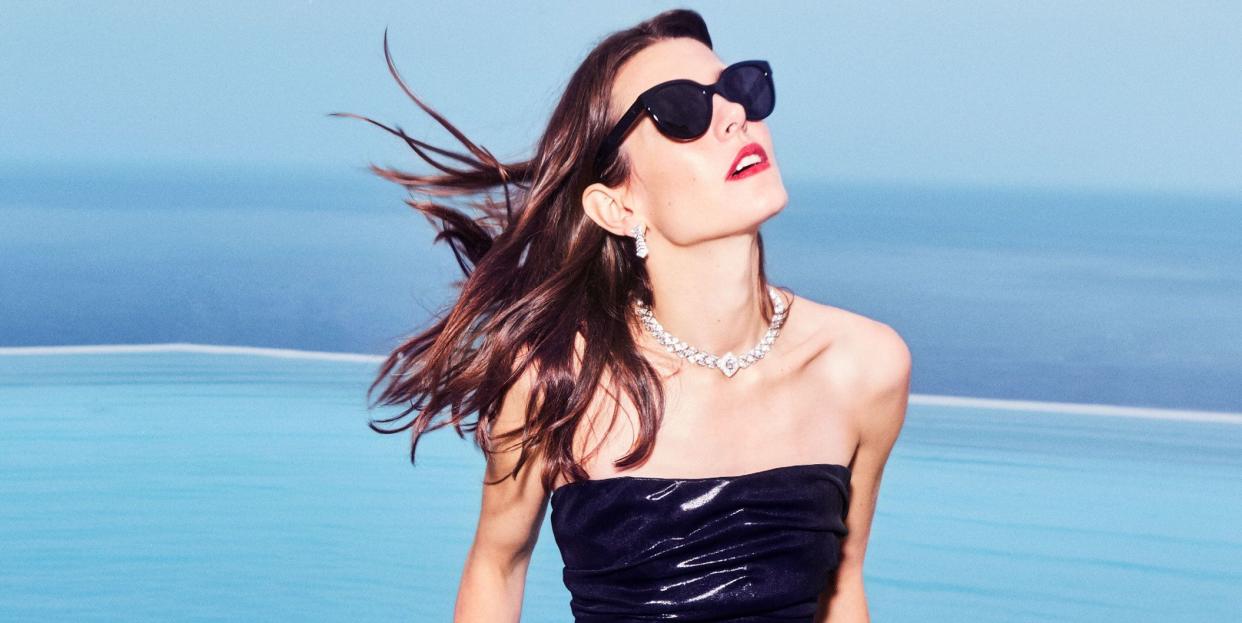
- Oops!Something went wrong.Please try again later.
- Oops!Something went wrong.Please try again later.
- Oops!Something went wrong.Please try again later.
"Hearst Magazines and Yahoo may earn commission or revenue on some items through the links below."
Charlotte Casiraghi is perched on a sharp-angled armchair, leaning forward with the anticipation of a child waiting for her birthday party to begin. And this really is her kind of party: a literary salon at the late Karl Lagerfeld’s photo studio, a soaring, skylit room on the Rue de Lille, in Paris’s 7th Arrondissement, where the walls are covered floor to ceiling with books.
Her hair is pulled back into a sleek ponytail, and her square jaw is in profile as she faces the other women on the stage, the Cameroonian author Léonora Miano, the literary historian Fanny Arama, and the actress Anna Mouglalis. The novelist Marie NDiaye is seated in the front row, next to Casiraghi’s husband, the French film producer Dimitri Rassam, and Chanel creative director Virginie Viard, who is staging the house’s spring collection in a few days and conceived these “rendez-vous littéraires” with Casiraghi when she became an ambassador for Chanel two years ago. Unlike the mob scenes outside a typical fashion show, the crowd here is modest, a mixture of rapt French journalists and academics, though seemingly only attractive ones.
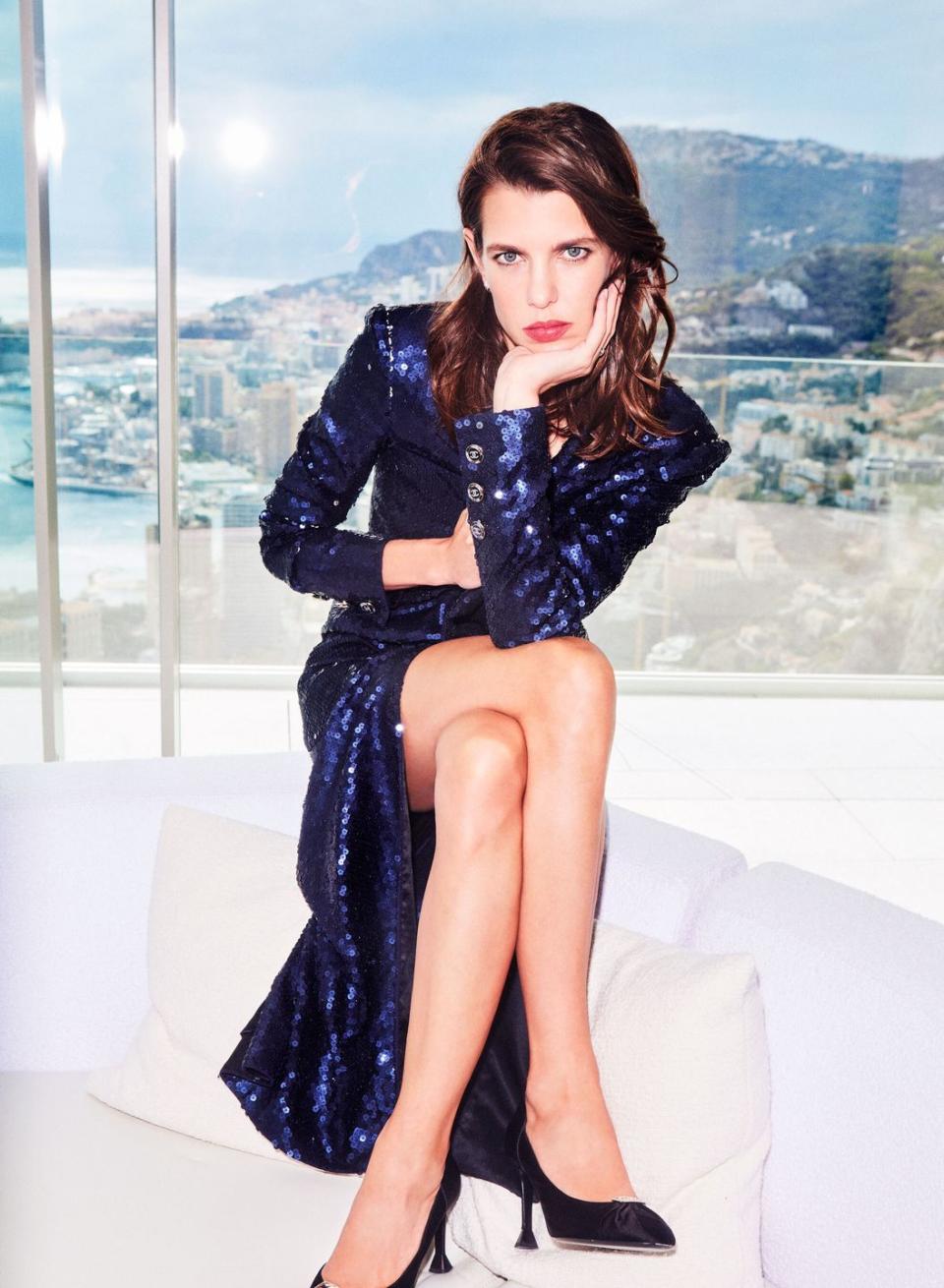
In fact, the evening—low-key, highbrow, and decidedly unflashy—is much more in keeping with Casiraghi’s preferred modus operandi. At 36, the scion of House Grimaldi, Monaco’s ruling dynasty, is defying the public’s expectation of an idle or frantic royal. Where her uncle Prince Albert II and his wife Princess Charlene provide the tabloids with a rollercoaster of content, and Prince Harry and Meghan Markle chase an increasingly long list of brand extensions, Casiraghi stays out of the limelight, happy to do her duty, albeit quietly and with spare time for her own nerdy pursuits. During lockdown, when the rest of the world was at home baking bread and planting zinnias, Casiraghi took advantage of the time to return to university and take a philosophy course. She’s not even active on Instagram, though some amateur Poiroting reveals a private account that nods to her intellectual interests, @Charlotte_Philo_Monaco.
“There’s always the surprise: ‘Oh, really? You’re studying? We thought you would be sitting by the pool and just chilling,’ ” Casiraghi tells me. “I find that when you’re in the academic world, what counts is what you’re writing. We judge you on your capacity to think and do research and not really where you come from.”
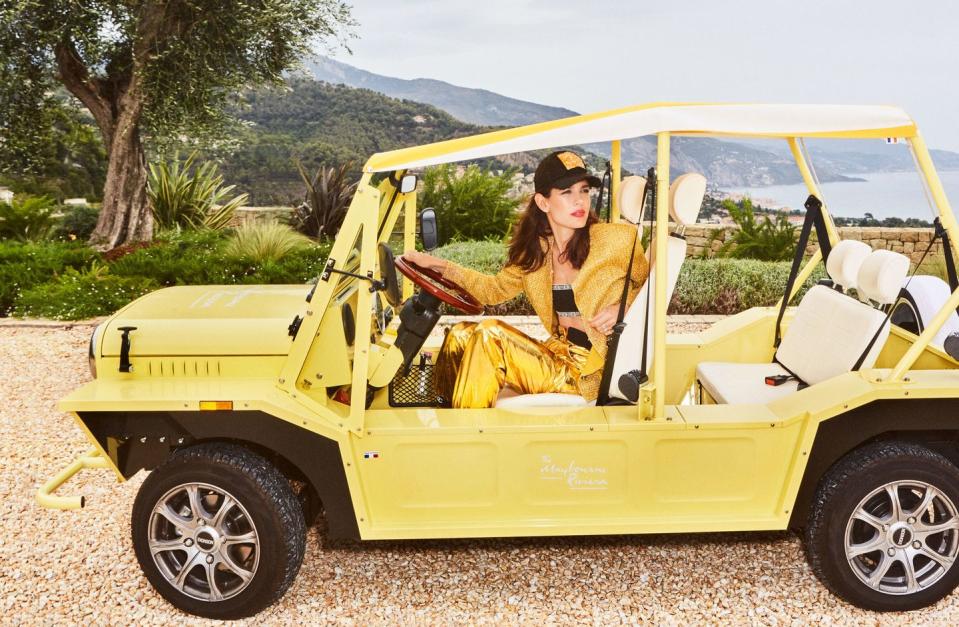
Though Casiraghi is notably not titled princess, a choice her mother, Caroline, Princess of Hanover made to protect her daughter’s autonomy, she is still 11th in line to the Monégasque throne and the most glamorous descendant of a storied lineage, following in the footsteps of her late grandmother, Princess Grace (née Kelly). (Officially, Charlotte takes the name of her father, Italian businessman Stefano Casiraghi, who died in a boating accident when she was young.) Calm and composed, Casiraghi is the closest thing the French have to an enchanting royal, and they practically claim her as their own, as Monaco, a petite principality the size of Central Park (the second-smallest sovereign state, after Vatican City), feels like a glittering appendage of southern France. The French press have breathlessly covered Casiraghi’s every move, from her four-year romance with Franco-Moroccan comedian Gad Elmaleh to her 2019 wedding to Rassam at the Prince’s Palace, where her grandmother married Prince Rainier in 1956.
“What amazes me the most is her curiosity, her desire to know,” says the professor and journalist Robert Maggiori, Casiraghi’s former philosophy teacher. “Sometimes she seems distracted, or withdrawn inwardly, but in reality she listens to everything, absorbs everything like a blotter.”
Viard says, “She embodies the Chanel allure all while remaining true to her own world.” Even stoic security guards flutter over Casiraghi. When we meet a day earlier at Chanel’s haute couture salon, the man who leads me up the famous mirrored staircase ascended by so many boldface names whispers reverentially, “La princesse est déjà arrivée.”
Upstairs, Casiraghi is lounging on a slip-covered fauteuil, sipping rosemary water (“good for digestion”) from a pink reusable water bottle patterned with red hearts that match her burgundy nails. Her hair is down, silky and chestnut like the mane of one of the horses she used to ride competitively. She no longer has time for the sport, she confides. A mother to two boys, Raphaël, eight, and Balthazar, four, Casiraghi splits her time between caring for them and organizing the Rencontres Philosophiques, a monthly philosophy conference in Monte Carlo that she runs with Maggiori, with whom Casiraghi also co-wrote The Archipelago of Passions, a book of philosophical essays, in 2018.
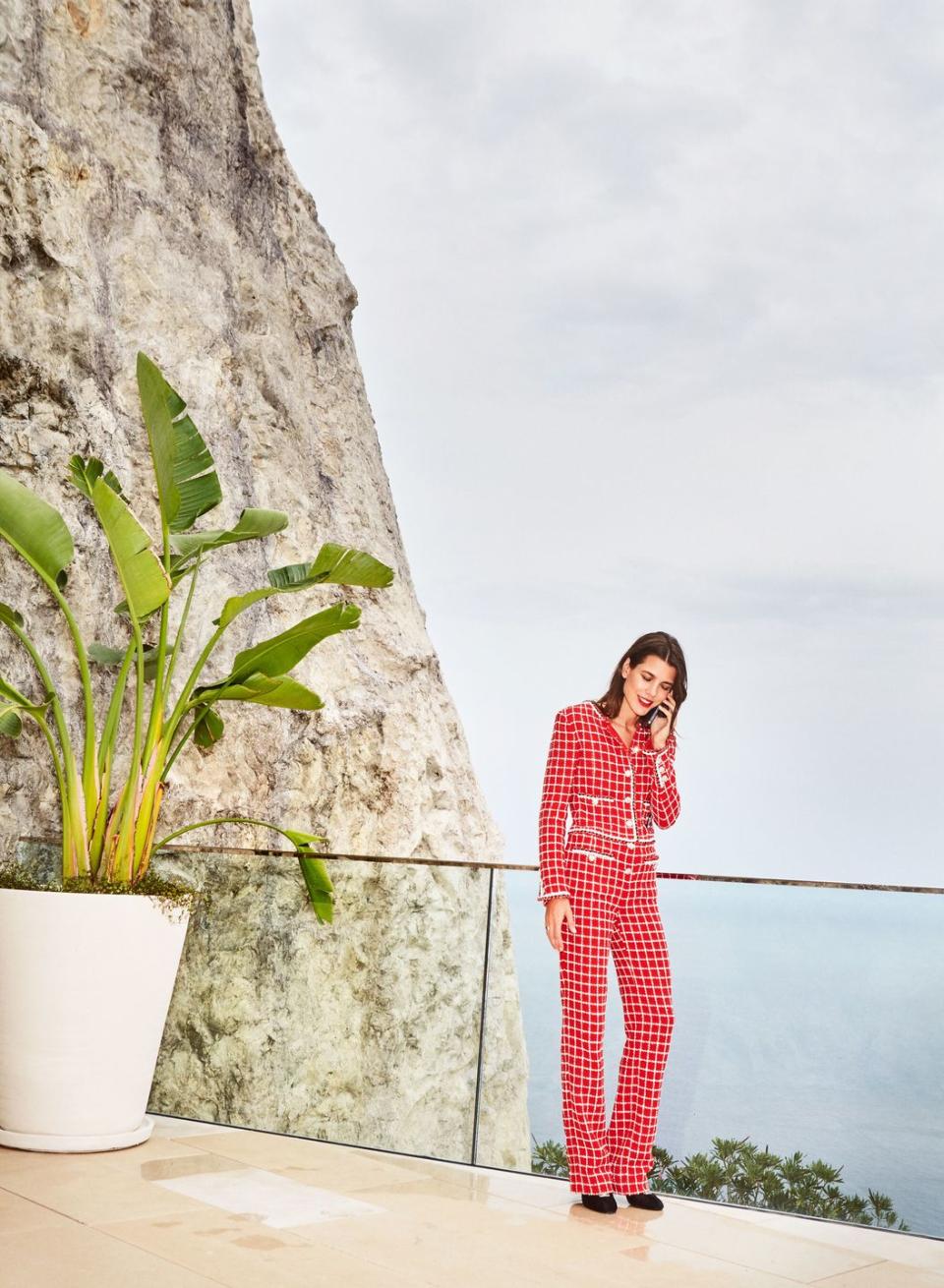
“Now, in the past couple of years, in the academic world if you say Monaco, it’s related to philosophy,” she says proudly of the city-state, which is more commonly known as a tax haven and yacht parking lot.
Likewise, Les Rendez-Vous Littéraires was Casiraghi’s homage to another mentor, Lagerfeld, the Chanel visionary and a lifelong friend of her mother’s. The designer doted on young Charlotte, giving her books when she spent summer holidays at La Vigie, his neoclassical clifftop villa on the Côte d’Azur: a volume of the German philosopher Johann Fichte during her early philosophy studies, the letters of Virginia Woolf when she expressed an interest in female voices. “He had a passion for certain women writers,” Casiraghi says, noting Lagerfeld’s love of Katherine Mansfield and Emily Dickinson. “It’s something he really gave me access to at a young age.”
But it was the women in her family, her mother especially, who led by example and taught Casiraghi how to navigate public life with poise, she says. “I would say that one of the most important things is—I don’t know how to translate to English—but exigences en soi-meme.” Her English is flawless (after studying at the Sorbonne she interned at the Independent newspaper in London), and she has an aristocratic clarity and precision when she speaks, but this is a difficult translation. Google tells her exigences means requirements, but she insists it is more than that—the idea of expectations of oneself, of living up to a moral standard.
“That no matter how successful you are, no matter how well you think you’ve done, you have to always keep that exigences,” she says. “And that’s something my mother has, that sense of effort and discipline.” There is much to admire in Casiraghi’s discretion, and it has served her well throughout her young life. In her twenties she went out with her aristo friends, but unlike other royals she never caused even a soupçon of scandal—no spilling out onto the cobblestones outside Maxim’s in the wee hours. The closest she came was having her son Raphaël when she and Elmaleh were just dating, but it was 2013, and it was more refreshing than shocking.
“The fact that other people can be interested in your life is not necessarily something you should be proud of or be overwhelmed by, because in the end the most important thing is what you build personally and for other people around you,” she says earnestly. “You can’t give too much importance to what other people think about you. Meaning that if I go into a restaurant and there are people that are staring at me, somehow I just don’t see it. Not because I’m not aware. It’s just that it’s something that I’ve decided to not really give importance to. Otherwise you’re suffocating.”
She pauses a moment, sipping her rosemary water. I don’t know if she is so much media-trained as thoughtful and naturally private. “She was very scrupulous and anxious to do well,” Maggiori tells me of his first impression of the 18-year-old high school student preparing for her baccalaureate. “She turned in her homework at the last minute, always wanting to modify, amend, add something so that the essay would be the best possible.” During our time together I notice she’s still like this, prone to considering a question before answering not because she’s searching for a way to deflect but because she is a thorough student who clearly considers all angles of an assignment.
“Of course, there are moments when it’s difficult to feel that you can’t do things without someone commenting or intruding,” she says. “But I feel I’ve made choices where what I do or the things I develop through studying, through writing, through all the things that interest me deeply, that in the end it’s something that no one can really interfere with.”
For her part, Casiraghi seems undaunted by the mythic status of her background. Though she has several pieces from her grandmother’s wardrobe, the majority of it is archived at the palace. “I’m not going to tell you, ‘Oh, I wear this for lunch at home,’ ” she says of her grandmother’s heirlooms, which include a color wheel of mousseline scarves and a tweed hunting skirt suit. “But sometimes I can wear the jacket with a shirt.” With her mother’s clothing she says it’s much easier. “We can just go in her closet.”
Casiraghi’s own style is dictated by the demands of motherhood and professional obligations. “It’s trainers, T-shirt, and blazer. It’s not that I necessarily like to dress like that, but with children I have no space in my mind to pick a cool outfit,” she says, glancing down at her outfit: wide leg black jeans with Chanel sock booties and a quilted leather bomber. “I see the difference today. I don’t have the kids. I had a little more time this morning.”
When in Monaco (she lives near her brothers Pierre and Andrea and their families, and the cousins play together often) Casiraghi ferries Balthazar and Raphaël to and from school—French children go home for lunch, bien sûr—and limits their screentime. “I would say the typical day is not that exciting or different from many moms’,” she says. Like their mother, the boys are voracious readers; Raphaël tends toward classic comics like Tintin and the Smurfs and recently loved The Little Prince (I’ll refrain from making the obvious joke), while Balthazar enjoys Greek mythology, especially stories about Zeus and Hercules.
“It’s very hard to sum up,” she says when asked about the biggest challenges of motherhood. “I think every day has hard and amazing moments. Every day you go through moments when you worry for your children or when they exhaust you, and then you go through moments when you share so much with them and you don’t even question the fact that they’re the most important thing in your life.”
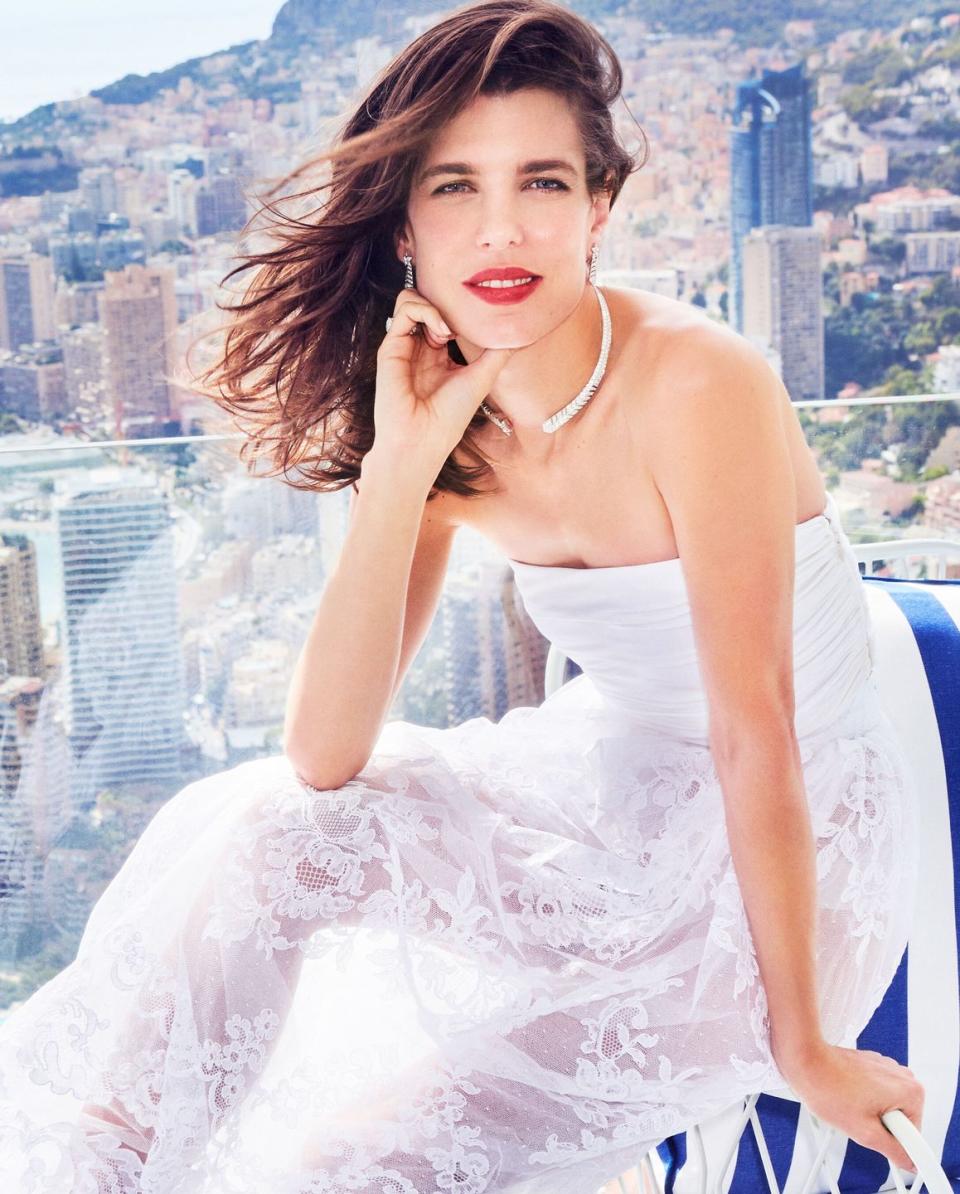
A mother of two myself, I ask her whether being a parent has given her a new perspective on her relationship with her own mother, as it has with mine. Once more she pauses before answering. “Yes, I feel you can be closer. Of course, you have more empathy and you understand more things, because it is a transmission of the maternal link…” She trails off, noting that she isn’t exactly sure how to phrase this in English. Despite her facility with the language, here is an intimate subject that would be better served by her native tongue.
“Of course,” she continues, a little haltingly, “when you become a mother there is the fact that your mother accepts that she’s not the only one who’s a mother. And that’s very liberating. A lot of women feel that they have that power as well, to give life, and it’s not something that they just owe to their mother. So of course you reflect differently… Because the mother-daughter relationship is very complex.”
Then, unsurprisingly, after a few moments of frank consideration, she retreats. “I try not to speak about my very private relationship with my mother, and I don’t necessarily want to reveal everything that’s going on between us, but it’s always ambivalent. I feel that even when you have your own kids, you’re still struggling to have your own space.”
This is the most vulnerable I see Casiraghi in the two days we spend together, and the crack in her otherwise impeccable presentation makes her more human. Back at Les Rendez-Vous Littéraires, her own space, guests are given a tote bag printed with a quote from Miano’s autobiographical novel, Stardust: “Tout ce qui lui importe, c’est de se frayer un chemin vers la vie.” (“The important thing is to find a path toward life.”) Indeed, Casiraghi seems to be doing just that. As the guests filter out, she and Rassam chat with the author like the chicest parents at a book club, he decked out in elevated dadcore, she in understated burgundy Chanel tweed. She sips from a flute of champagne and, at last, looks relieved, ready to move on to the next assignment.
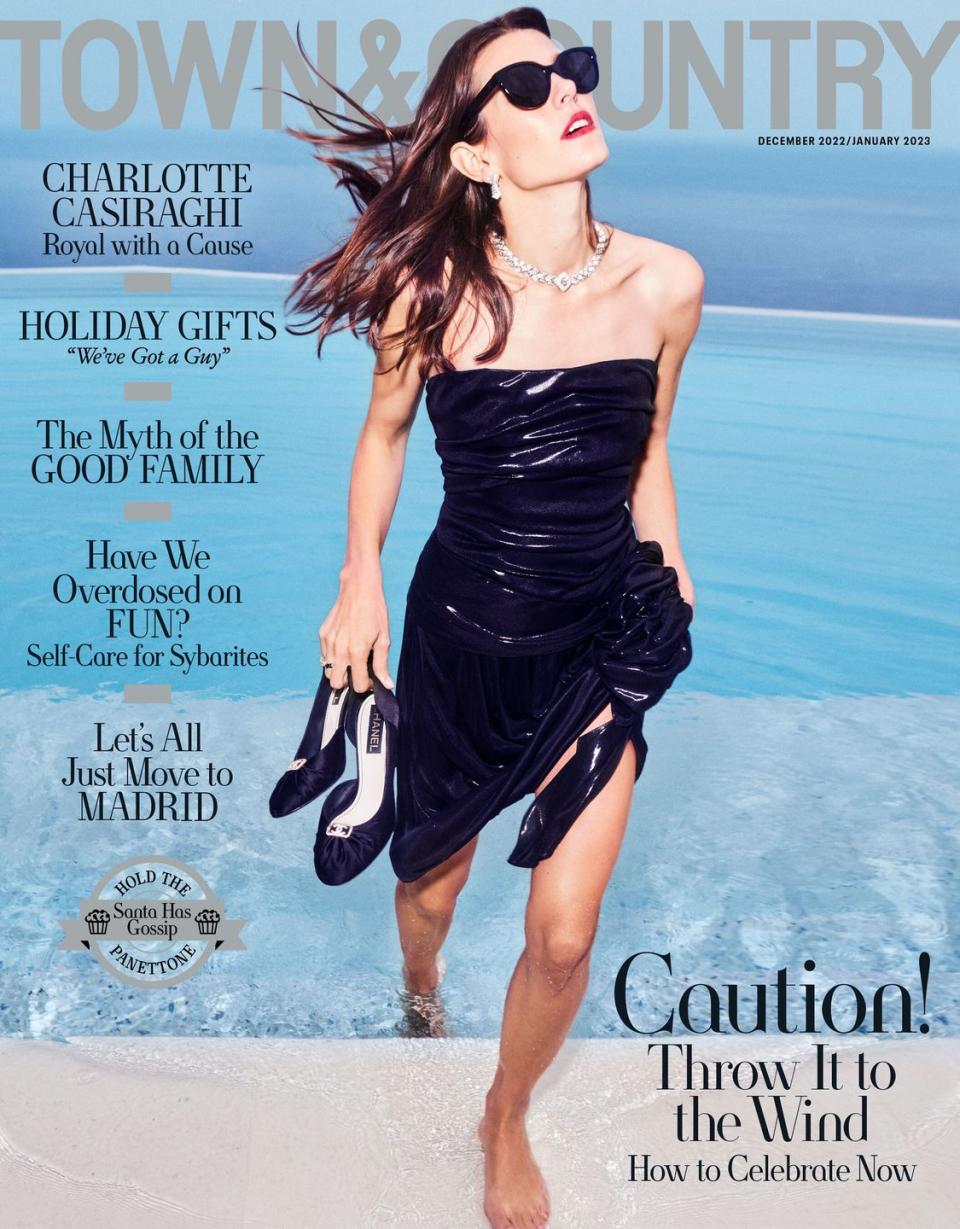
Photographs by Ellen Von Unwerth
Styled by Tania Rat-Patron
Hair by Alex Lagardère at John Nollet. Makeup by Tom Pecheux at See Management. Nails by Cindi Zanetti. Production by K/O Collective. Shot on location at the Maybourne Riviera in Roquebrune-Cap-Martin, France.
In the top image: Chanel dress ($4,750), pumps ($1,500), and sunglasses ($445); Chanel high jewelry earrings, necklace, and ring 800-550-0005.
This story appears in the December 2022/January 2023 issue of Town & Country. SUBSCRIBE NOW
You Might Also Like

